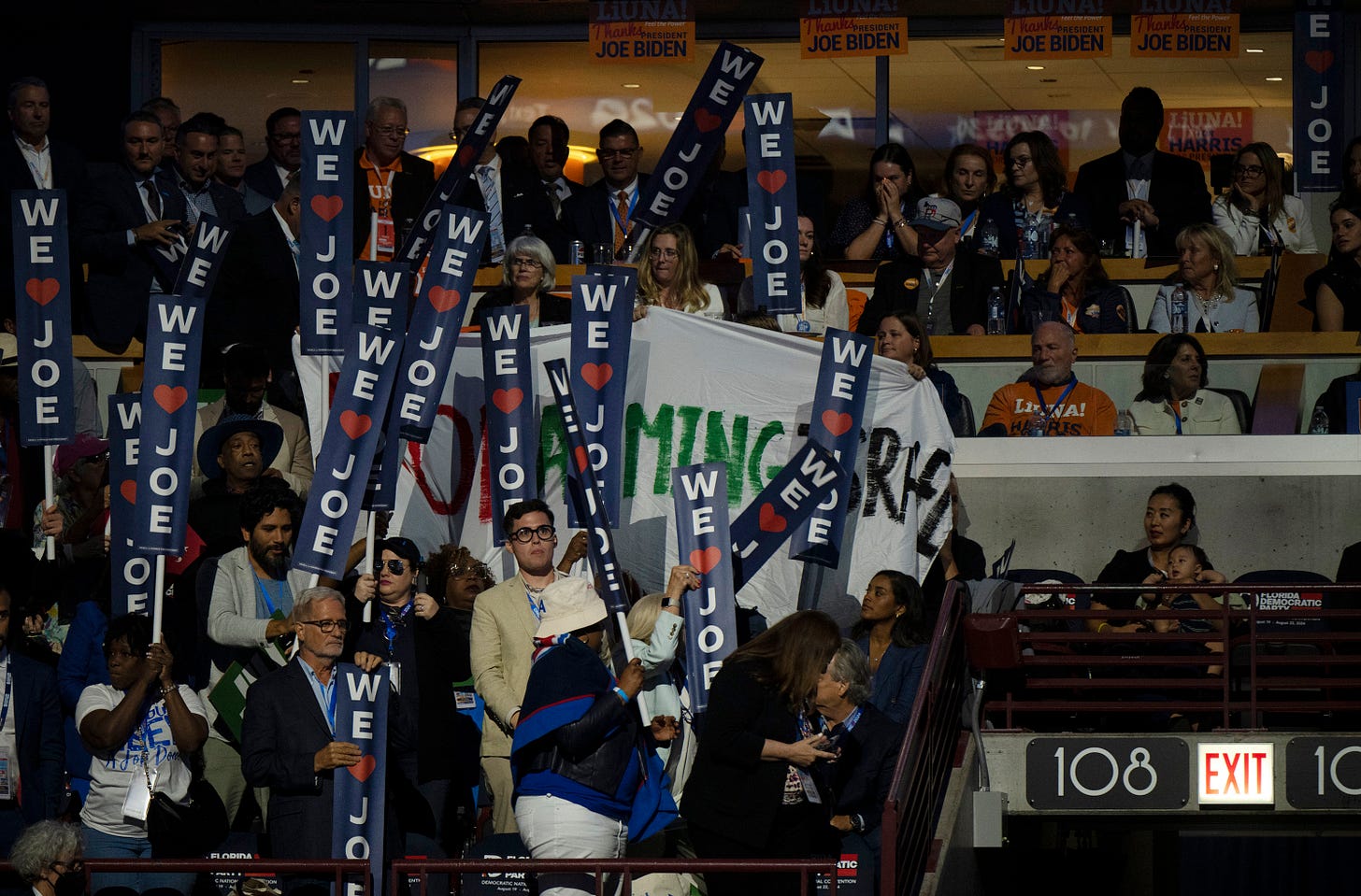'Blue-pilled': Democratic Enthusiasm Insulates DNC Attendees From the Horrors of Gaza
Prem Thakker shares his sober realizations after two days at the DNC.

My second day at the Democratic National Convention led to a realization. For all the talk about mass protests and heightened security, about disruption and the pro-Palestinian movement overtaking events, things have not materialized in a way that's taken any kind of spotlight away from the DNC. If anything, the DNC – its delegates, the headline speeches, the whole vibe – seems so insulated that one could assume there isn't a genocidal war, with more than 40,000 Palestinians killed, that the Biden-Harris administration is currently fueling. Based on how attendees have behaved, one could assume Gaza is no big deal really, a now-rote nuisance some have to merely account for in their daily motions.
“When they [the police] had ‘controlled’ the protest, everyone was watching it live on the CNN live feed in the bus,… [and] everyone started clapping and applauding,” a Democratic delegate told me in describing what happened on Monday as convention attendees passed time in a long line of delayed shuttles to the United Center. That’s worth repeating: DNC attendees cheered as the police “controlled” those protesting against what human rights groups worldwide call a genocide (a US-funded one). One murmur traveling across the bus, sparking much excitement, was that the police even used tear gas (something that did not, in fact, seem to happen).
Buses leading to the convention were stalled in part due to protest activity on Monday, according to the Secret Service, but “two other separate shuttle bus incidents caused significant bus delays,” CNN reported, and subsequent bottlenecks of entrances compounded the delays.
The delegate I spoke to said they broadly sympathized with their fellow passengers who were relieved to finally get moving, but not to such an extent to applaud and cheer once the protesters were cleared out of the way. “I mean, they were just like, ‘great, now we can move on,’ which I’m worried is the sentiment of the party generally – ‘okay, great, that’s dealt with, that was annoying. Now what.’”
Such seems to be the current undergirding much of the DNC in Chicago. Some have welcomed overtures like the DNC sanctioning a panel discussion on Palestinian human rights, or mass applause in response to Rep. Alexandria Ocasio-Cortez suggesting that Kamala Harris is working towards a ceasefire, or Sen. Bernie Sanders simply demanding a ceasefire and hostage release.
That same level of applause – and then some – came in response to the appearance of former Secretary of State Hillary Clinton, who just months ago suggested that thousands of American college students protesting the war on Gaza “don’t know very much.”
It’s not entirely surprising that a room full of Democratic partisans would applaud someone many of them may still mourn the slim electoral loss of. Yet, the ability of the room to be as booming for peace as they are for someone who mocked those who have led the charge for it suggests a certain dissonance – between said audience’s concern for what ought to be a moral party crisis and their reverence for those who have overseen it.
A Genocidal “Hiccup”
Throughout Tuesday, I spoke with a wide range of delegates, guests, and other convention attendees. When I asked one about possible ruffles in Biden’s legacy regarding his support for Israel’s war on Gaza, it was brushed aside as a “hiccup” – the type of thing all presidents’ legacies can supersede.
Such a dynamic perhaps is underscored by President Joe Biden’s own remarks Monday night. During his speech, DNC audience members unfurled a banner, which read “Stop Arming Israel.”
In response, the audience began booming, “We love Joe!” as one man snatched the banner. Others appeared to use their “we love Joe” cheer signs to bat at the banner and those holding it – a woman wearing a hijab and a Jewish man.

Biden, for his part, acknowledged the thousands outside demanding an end to Israel’s war on Gaza. The tepid nod could be read as a tonal shift, or as something much more grim.
“Those protesters out in the street, they have a point; a lot of innocent people are being killed, both sides,” he said, while discussing his apparent efforts to achieve a ceasefire in the war he’s sent billions of dollars towards continuing.
The comment was notable not simply because of the now precedented discordance between rhetoric and action; but because such an admission – damning against one’s own actions, yet toothless nonetheless – only comes from someone who feels insulated from having to actually grapple with the logical conclusion of conceding that those protesters “have a point.”
It evoked a similar spirit to the Democrats’ new 92-page platform, which began with a land acknowledgment – a formal statement recognizing the Indigenous people who originally inhabited the country – while also including a section on Israel and Palestine that maintained the Biden administration’s disastrous policies. Biden’s comfort in saying protesters “have a point” rings as flippantly as this use of a land acknowledgment: a statement only with serious implications if taken seriously.
After all, the Biden administration has for months assured, over and over, that a ceasefire is apparently right around the corner. Last month, his State Department said they were in the “10-yard line.” Nearly two weeks ago, the White House said a ceasefire deal is “as close as we think we have ever been.” In those same weeks, the US not only authorized the $20 billion in weapons sales – it advanced $262 million in munitions and $3.5 billion to buy more US weapons. But, the US assured, despite the export of more violence, trust that a deal for peace is just on the horizon.
“I’m drinking that mainline right into my veins”
The dynamic is not new.



